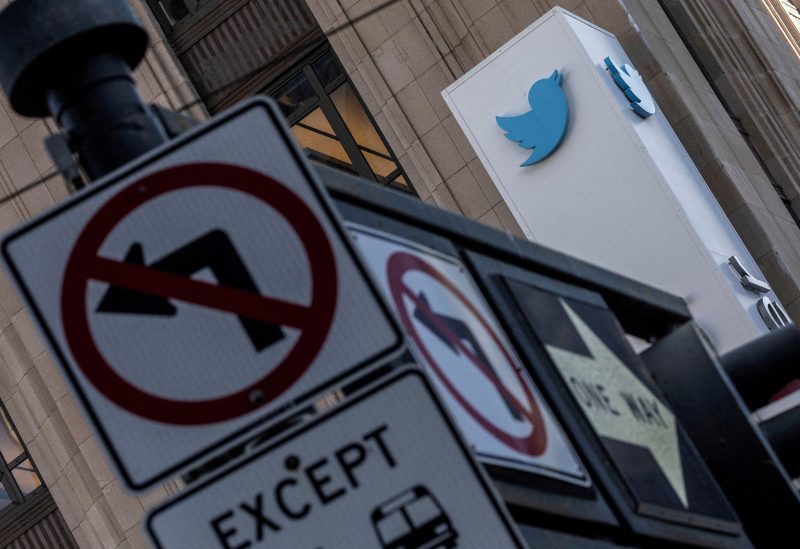
A view of the Twitter logo at its corporate headquarters in San Francisco, California, U.S. November 18, 2022. REUTERS/Carlos Barria/File Photo
The U.S. Supreme Court on Wednesday is set to hear for a second straight day a bid to hold internet companies accountable for contentious content posted by users, this time involving a lawsuit against Twitter Inc by the American relatives of a Jordanian man killed in a Istanbul nightclub massacre.
The justices on Tuesday heard arguments in an appeal arising from a separate lawsuit against Google LLC-owned YouTube, part of Alphabet Inc, by the family of an American woman killed in a Paris attack by Islamist militants. Both lawsuits were brought under a U.S. law that enables Americans to recover damages related to “an act of international terrorism.”
Relatives of Nawras Alassaf accused Twitter of aiding and abetting the Islamic State group, which claimed responsibility for the Jan. 1, 2017, attack that killed him and 38 others shortly after midnight during a New Year’s celebration, by failing to police the platform for its accounts or posts.
Twitter is appealing after a lower court allowed that lawsuit to proceed and found that the company had refused to take “meaningful steps” to prevent Islamic State’s use of the social media platform.
The nine justices in the case argued on Tuesday appeared torn over whether to narrow a form of legal immunity provided under Section 230 of the Communications Decency Act that shields internet companies from a wide array of lawsuits. The lower court dismissed that case largely based on Section 230 immunity.
That case involves a bid by the family of an American woman named Nohemi Gonzalez who was fatally shot in a 2015 rampage in Paris – an attack for which Islamic State also claimed responsibility – to hold Google liable for recommending to certain YouTube users content from the group.
In the Twitter case, the San Francisco-based 9th U.S. Circuit Court of Appeals did not consider whether Section 230 barred the family’s lawsuit. Google and Meta’s Facebook also are defendants, but did not formally join Twitter’s appeal.
A key issue is whether the family’s claims sufficiently allege that the company knowingly provided “substantial assistance” to an “act of international terrorism” that would allow the relatives to maintain their suit and seek damages under the anti-terrorism law.
President Joe Biden’s administration is backing Twitter in the case, saying the Anti-Terrorism Act imposes liability for assisting a terrorist act and not for “providing generalized aid to a foreign terrorist organization” with no causal link to the act at issue. The administration backed the plaintiffs in the case argued on Tuesday.
Islamic State called the attack revenge for Turkish military involvement in Syria. The main suspect, Abdulkadir Masharipov, an Uzbek national, was later captured by police.
Twitter in court papers has said that it has terminated more than 1.7 million accounts for violating rules against “threatening or promoting terrorism.”
Rulings in both cases are due by the end of June.